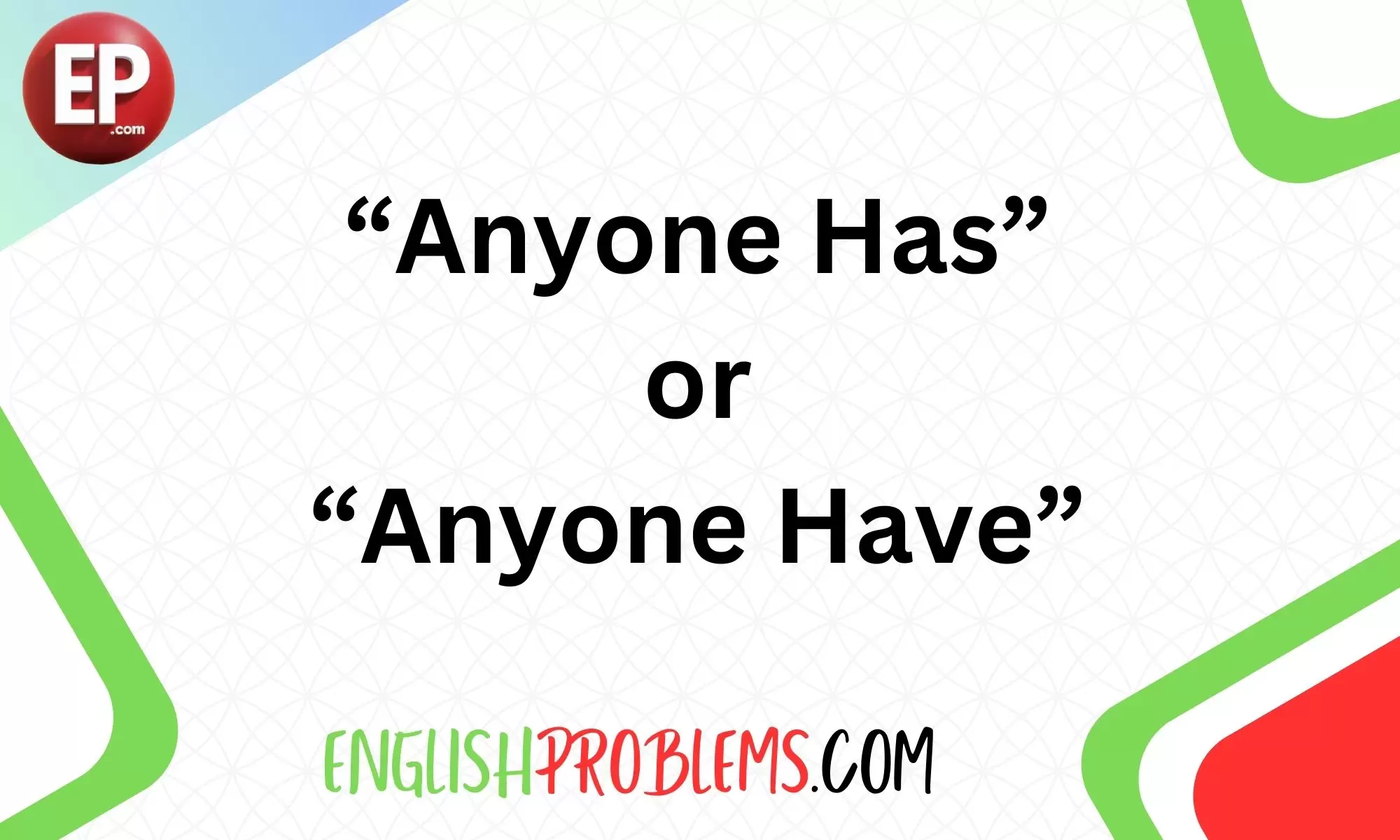Understanding when to use “anyone has” versus “anyone have” can be a challenge for many English speakers. This confusion often stems from the complex rules of subject-verb agreement and the nuances of English grammar.
In this comprehensive guide, we will delve into the grammatical rules, common mistakes, and practical examples to help you navigate the proper usage of these phrases.
Understanding the Basics: ‘Anyone Has’ vs. ‘Anyone Have’
When it comes to phrases like “anyone has” and “anyone have,” the key lies in understanding how indefinite pronouns like “anyone” function in sentences.
Definitions and Overview:
- Anyone: An indefinite pronoun used to refer to any person, regardless of identity.
- “Has”: The third-person singular form of the verb “to have.”
- “Have”: The base form of the verb “to have,” typically used with plural subjects or the pronoun “I” or “you.”
Quick Rule of Thumb
The general rule is:
- “Anyone has”: Use this form when “anyone” is the subject and you need to match it with a singular verb.
- “Anyone have”: This form is less standard and can appear in informal speech or specific regional dialects but is not typically used in formal writing.
Grammatical Rules: When to Use ‘Anyone Has’
The correct usage of “anyone has” follows standard subject-verb agreement rules in English. Here’s a breakdown:
Subject-Verb Agreement
In English, subject-verb agreement requires that the verb matches the subject in number and person. Since “anyone” is treated as a singular pronoun, it takes a singular verb form.
Example Sentences:
- Correct: “Anyone who wants to join the club has to sign up by Friday.”
- Incorrect: “Anyone who wants to join the club have to sign up by Friday.”
Formal Usage: In formal writing and speech, it is crucial to use the correct verb form to maintain professionalism and clarity. The phrase “anyone has” aligns with these standards and ensures proper grammatical structure.
Conditional Clauses and Statements
Conditional sentences often use different verb forms depending on their structure. Let’s explore how these clauses influence the usage of “anyone has.”
Structure of Conditional Clauses
Conditional sentences typically have two parts:
- The if-clause: States the condition.
- The main clause: States the result or outcome.
Examples:
- First Conditional: “If anyone has any questions, they should ask during the meeting.”
- Second Conditional: “If anyone had known about the issue, they would have fixed it.”
In the first conditional, “anyone has” correctly fits the singular subject in the main clause.
Formal Sentences and Correct Structures
Formal writing demands adherence to strict grammatical rules, and the use of “anyone has” is a perfect example of this.
Correct Structures
In formal contexts, using the correct verb form is essential. The phrase “anyone has” is appropriate for formal communication, ensuring clarity and precision.
Correct Examples:
- Business Email: “Anyone who requires assistance with the project has been assigned a mentor.”
- Academic Paper: “Anyone who has completed the preliminary research should submit their findings.”
Comparison with Informal Usage
In contrast, informal language might sometimes use “anyone have,” especially in spoken English. However, this form is not considered standard in formal writing.
Common Mistakes and Exceptions
Understanding common errors helps in mastering proper usage. Let’s look at typical mistakes and exceptions.
Common Mistakes
- Incorrect: “Anyone have any updates on the project?”
- Correction: “Anyone has any updates on the project?”
- Incorrect: “If anyone have any concerns, let me know.”
- Correction: “If anyone has any concerns, let me know.”
Exceptions
While “anyone have” is not standard in formal contexts, it may appear in regional dialects or casual speech. For example, in some English dialects, “anyone have” might be used colloquially, but this usage is generally avoided in formal settings.
Exploring the Use of ‘Anyone Have’
Although “anyone have” is less common, it can still appear in specific contexts.
Usage Contexts
- Informal Speech: In casual conversation, “anyone have” might be used.
- Example: “Anyone have a pen I can borrow?”
- Regional Variations: Some English dialects might use “anyone have” more frequently.
- Example: In certain regions, speakers may use “anyone have” without adhering strictly to traditional grammar rules.
Acceptance
In formal writing and professional settings, it is best to stick with “anyone has” to ensure proper grammar and clarity.
Incremental Nuances in English Grammar
English grammar has many subtleties, and understanding these nuances can improve your command of the language.
Subtle Differences
- Formal vs. Informal: The distinction between “anyone has” and “anyone have” often boils down to formality.
- Regional Usage: Different regions may have varying norms for using these phrases.
Examples:
- Formal: “Anyone who has completed the course will receive a certificate.”
- Informal: “Anyone have a spare ticket?”
The Role of Indefinite Pronouns
Indefinite pronouns like “anyone” are crucial in understanding verb forms.
Definition
Indefinite pronouns refer to non-specific people or things and can affect verb forms.
Impact on Verb Forms
- Singular: Indefinite pronouns such as “anyone,” “everyone,” and “someone” are treated as singular.
- Example: “Anyone has the right to voice their opinion.”
Subject-Verb Agreement with ‘Anyone’
Rule Explanation
Subject-verb agreement requires that the verb agrees with the subject in number and person. Since “anyone” is singular, it takes a singular verb form.
Practice Examples
Correct:
- “Anyone who has visited the museum can attest to its quality.”
Incorrect:
- “Anyone who have visited the museum can attest to its quality.”
Understanding Singular Versus Plural Contexts
Singular Pronouns: “Anyone” is a singular pronoun, so it requires a singular verb form.
Examples
- Singular: “Anyone has the right to participate.”
- Plural: “All of you have the right to participate.”
Practical Examples in Everyday Language
Using proper grammar in everyday language ensures clear communication.
Real-Life Examples
Correct Usage:
- “Anyone who has completed the assignment should submit it by Friday.”
- “Does anyone have the latest report?”
Everyday Usage:
- In casual conversation, people might say “Anyone have” but should aim for “Anyone has” in formal contexts.
Clarifying Common Confusions with Pronunciation Tips
Mispronunciation can sometimes lead to confusion between “anyone has” and “anyone have.”
Pronunciation Tips
- “Has”: Pronounced /hæz/.
- “Have”: Pronounced /hæv/.
Tips
- Practice pronunciation to avoid misunderstandings.
- Use clear enunciation in both speech and writing to ensure your message is understood correctly.
Additional Insights: ‘Anybody Have’ vs. ‘Anybody Has’
Comparing “anybody” with “anyone” provides further clarity.
Comparison
- “Anybody has”: Correct in formal contexts.
- Example: “Anybody who has seen the movie should share their review.”
- “Anybody have”: More informal and less standard.
- Example: “Does anybody have a question?”
Rules and Examples
- “Anybody has”: Preferred in formal writing.
- “Anybody have”: Acceptable in casual conversation but less appropriate in formal contexts.
Conclusion
Understanding the proper usage of “anyone has” versus “anyone have” is essential for clear and effective communication. By following grammatical rules, recognizing common mistakes, and practicing with real-life examples, you can improve your command of English grammar.
Final Tips
- Use “anyone has” in formal writing and speech.
- Reserve “anyone have” for informal contexts or regional dialects.
- Practice subject-verb agreement to enhance your grammar skills.
Feel free to revisit this guide whenever you encounter confusion with these phrases. Happy writing!
This detailed exploration should provide clear guidance on the topic and help ensure proper usage in both formal and informal contexts.

Nicholas Clark is a master wordsmith with a passion for unraveling the complexities of the English language. With a keen eye for detail and a love for grammar, he transforms tricky language issues into engaging and understandable lessons. Nicholas’s insightful articles make mastering English a delightful journey.










